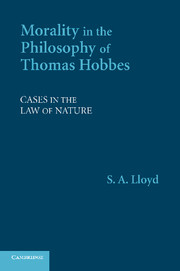Book contents
- Frontmatter
- Contents
- Preface
- Introduction
- PART ONE MORAL PHILOSOPHY, METHOD AND MATTER
- PART TWO FROM PSYCHOLOGY TO MORAL PHILOSOPHY
- 3 The Law of Nature: Definition and Function
- 4 A Critical Examination of Derivations of the Laws of Nature
- 5 The Reciprocity Interpretation of Hobbes's Moral Philosophy
- PART THREE FROM MORAL PHILOSOPHY TO CIVIL PHILOSOPHY
- Bibliography
- Index
5 - The Reciprocity Interpretation of Hobbes's Moral Philosophy
Published online by Cambridge University Press: 30 September 2009
- Frontmatter
- Contents
- Preface
- Introduction
- PART ONE MORAL PHILOSOPHY, METHOD AND MATTER
- PART TWO FROM PSYCHOLOGY TO MORAL PHILOSOPHY
- 3 The Law of Nature: Definition and Function
- 4 A Critical Examination of Derivations of the Laws of Nature
- 5 The Reciprocity Interpretation of Hobbes's Moral Philosophy
- PART THREE FROM MORAL PHILOSOPHY TO CIVIL PHILOSOPHY
- Bibliography
- Index
Summary
[N]ot being circumscribed within reasonable bounds, their reason becomes invisible.
(A Discourse of Laws, p. 106)Thou shalt love thy neighbor as thyself … is the natural law, having its beginning with rational nature itself.
(EW II, 263–264)We have seen that neither Hobbes's definition of a Law of Nature nor the function reliably served by the Laws of Nature lends particular support to traditional desire-based derivations of those laws. We have also surveyed some of the problems that attend familiar versions of desire-based, duty-based, and definitional derivations. In this chapter I offer a derivation of Hobbes's Laws of Nature that I believe avoids the problems of alternative derivations, fits well with Hobbes's positions on the definition and function of the Laws of Nature, comports with his declared method, and enjoys substantial textual support.
OVERVIEW OF THE INTUITIVE ARGUMENT
Hobbes has a conception of correct philosophical method that requires him to argue from commonly agreed definitions by a series of linked syllogisms designed to reveal the logical connections among terms. Ideally, philosophical argument should proceed entirely analytically, and so nonanalytic premises (including probabilistic causal claims) are generally inappropriate to Hobbes's project of demonstrating his Laws of Nature.
However, it makes sense to distinguish between those improperly synthetic premises that are harmful to Hobbes's project and those that while improperly synthetic are nonetheless benign. Hobbes is engaged in the practical project of showing his countrymen that they have a good and sufficient reason to submit to the authority of their existing government.
- Type
- Chapter
- Information
- Morality in the Philosophy of Thomas HobbesCases in the Law of Nature, pp. 211 - 260Publisher: Cambridge University PressPrint publication year: 2009



